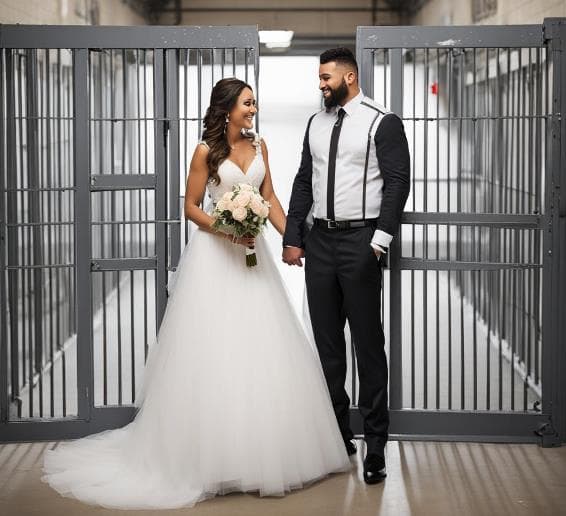Marriage is a sacred bond that brings together two individuals in a journey of love, understanding, and support. However, there are situations where this union takes a different path, such as marrying an inmate. This unconventional choice comes with its own set of challenges and rewards.
Marrying an inmate can offer emotional support and a sense of purpose to both partners, providing companionship during the incarcerated period. It grants important social benefits like regular visits and increased communication. However, it comes with challenges including limited physical contact and communication barriers due to prison rules, potentially causing stress and emotional strain for both spouses.
In this article, we explore the pros and cons of marrying an inmate to provide you with valuable insights that will help you make an informed decision about this life-changing choice.
Pros of Marrying an Inmate
1. Strong Emotional Connection
When two individuals connect on an emotional level, distance and barriers seem to diminish. Marrying an inmate often involves a profound emotional bond, as communication is stripped down to its purest form.
Through letters, phone calls, and occasional visits, couples can develop a deep understanding of each other’s thoughts and feelings.
2. Loyalty and Devotion
Incarceration can be a testing time for any relationship. However, marrying an inmate can strengthen the bond between partners, leading to unwavering loyalty and devotion.
Sharing this challenging journey can create a unique and unbreakable connection that withstands the test of time.
Read Also: Pros and Cons of Conjugal Visits in Prison
3. A Chance for Redemption
One of the significant benefits of marrying an inmate is the opportunity for rehabilitation and redemption. Supporting your partner through their incarceration can be a positive influence, encouraging them to reflect on their actions and make positive changes.
Many inmates find motivation and inspiration in the love and support of their spouse, which can lead to successful reintegration into society upon release.
4. Intimacy and Emotional Growth
Limited physical contact can foster emotional intimacy and growth. Couples often prioritize communication, leading to deep conversations and emotional vulnerability.
This emotional depth can lead to a profound understanding of each other’s hopes, dreams, and fears, fostering personal growth and strengthening the relationship.
5. Relatively Low Divorce Rates
Contrary to popular belief, the divorce rates among couples who marry inmates are often lower than the national average. The shared commitment to making the relationship work, despite the challenges, can result in long-lasting partnerships.
6. Opportunity for Personal Growth
Being in a relationship with an inmate encourages personal growth and self-improvement. It fosters patience, resilience, and a deeper understanding of the human capacity for change.
Cons of Marrying an Inmate
1. Physical Separation and Limited Contact
One of the most challenging aspects of marrying an inmate is the physical separation. Regular face-to-face contact may not be possible due to prison regulations, making it difficult to enjoy everyday activities together.
This lack of physical presence can be emotionally taxing and requires significant patience and understanding.
2. Emotional Strain and Stress
The emotional toll of having a loved one incarcerated can be overwhelming. Coping with the stress, uncertainty, and potential dangers associated with the prison environment can take a toll on mental health.
Both partners must be emotionally resilient and supportive to navigate these challenges successfully.
3. Social Stigma and Judgments
Marrying an inmate can attract social Stigma and Judgments. Friends, family, and even strangers may not fully understand the dynamics of such a relationship, leading to criticism and disapproval.
Overcoming these external pressures requires a strong sense of self and unwavering commitment to the partnership.
4. Limited Shared Experiences
Couples marrying inmates may miss out on the typical experiences that most relationships enjoy, such as going on dates, traveling together, or building a life outside of prison walls.
Adjusting to a different reality can be challenging, requiring adaptability and creativity in finding meaningful ways to connect.
5. Uncertain Future
Incarceration comes with inherent uncertainties. Early releases, parole hearings, and sentence modifications can create a sense of unpredictability in the relationship’s future. Couples must face these uncertainties together with hope and resilience.
6. Financial Strain
Supporting an inmate can be financially demanding, especially if they are unable to contribute to household expenses. It’s crucial to plan for this aspect carefully.
Check Also: What Happens When an Inmate Goes to the Hospital
FAQs
Can an Inmate Get Married While Incarcerated?
Yes, inmates have the legal right to get married, though the process may vary depending on the institution and state laws.
What Should I Consider Before Marrying an Inmate?
Consider the practical aspects like visitation rights, financial implications, and the emotional commitment required to support an inmate.
Can an Inmate’s Sentence Affect the Marriage?
Yes, the length and nature of the sentence can impact the dynamics of the marriage, including the frequency of visits and future plans.
How Can I Foster Trust in this Relationship?
Open and honest communication is crucial. Establishing trust will take time, but consistent support and understanding can lay the foundation.
Conclusion
Marrying an inmate is a complex and emotionally charged decision that should not be taken lightly. The pros and cons are distinct, and it’s essential to weigh them carefully. By providing emotional support, fostering trust, and navigating challenges together, this unique union has the potential to create a love story that defies all odds.
